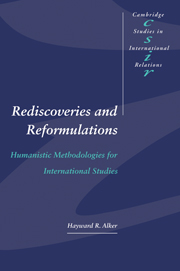Book contents
- Frontmatter
- Contents
- List of figures
- List of tables
- Acknowledgments
- Introduction: Voyages of rediscovery
- Part I Recovering Western antiquity
- Part II The humanistic science of the modern classics
- Part III Contemporary humanistic reformulations
- References
- Index
- CAMBRIDGE STUDIES IN INTERNATIONAL RELATIONS
Introduction: Voyages of rediscovery
Published online by Cambridge University Press: 13 January 2010
- Frontmatter
- Contents
- List of figures
- List of tables
- Acknowledgments
- Introduction: Voyages of rediscovery
- Part I Recovering Western antiquity
- Part II The humanistic science of the modern classics
- Part III Contemporary humanistic reformulations
- References
- Index
- CAMBRIDGE STUDIES IN INTERNATIONAL RELATIONS
Summary
From my writings over the last twenty years, I have selected and present here twelve essays with two common elements: first, my philosophical, methodological and disciplinary preoccupation as a social scientist with somehow voyaging between, connecting up, or finding a bridging place between the humanities and the sciences; secondly, their focus on the methodological and discipline-defining ideas of leading Western thinkers about International Studies since classical antiquity. Despite being professionally trained in a contradictorily named discipline called Political Science, I have resisted the temptation of attempting to resolve by fiat the problem of meaningful disciplinary coherence raised in the minds of my fellow ordinary language users by such a disciplinary label: how can a field of study deeply concerned with things that are so passionate, so value-laden, so personal and so encompassing as “politics” or “society” be a science? Is not the need to answer such a question even more difficult, but no less important when the goings and comings of international relations and world politics, as seen from many different vantage points, are the focus of attention?
My subtitle suggests a fresh attempt at social scientific synthesis, uniting the inclusive subject matter, the concern with discovering and shaping meaning, and the value orientations of the humanities with the methodological discipline, the formal rigor and the explanatory concerns one normally associates with the natural sciences. It suggests, as I shall try to demonstrate, the possibility of developing and deploying, with scientific rigor and international subject matter, methodologies appropriate for humanistic analytic purposes, which I take to include the comparative development and evidence-linked testing of explanatory historical generalizations.
- Type
- Chapter
- Information
- Rediscoveries and ReformulationsHumanistic Methodologies for International Studies, pp. 1 - 20Publisher: Cambridge University PressPrint publication year: 1996



